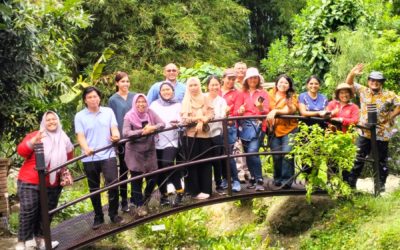Socfindo
11
Processing units
45 821 ha
Planted area
188 527 T
Palm oil production
6 397 T
Rubber production
10 169
Direct and indirect employees
Socfindo
Active in Indonesia since the beginning of the last century, the Socfin Group is an example of plantation development in the archipelago.
Socfin SA (Société Financière des Caoutchoucs) was founded in Indonesia in 1909. In 1911, the first palm trees were planted at Sungai Liput in the province of Aceh: Indonesia’s first palm grove was born. The first rubber trees were planted in Tanah Besih in 1923.
In 1965, Indonesia’s large plantations were nationalized. Later, a joint venture between Plantation Nord Sumatera (PNS) (60%) and the Indonesian government (40%) gave birth to Socfindo (PT Socfin Indonesia) in 1968. Thanks to this partnership, which is an example of development in the sector, the company ranked among Indonesia’s top 3 producers in 1984. In 2001, the government sold a majority stake to PNS, retaining 10%.
Socfindo is a model of agro-industrial business management in the country, particularly in the North Sumatra and Aceh regions. All its oil palm plantations have been ISPO-certified since 2016 and RSPO-IP-certified since 2020.
The plantations have made a major contribution to improving the living standards of the surrounding populations, thanks in particular to:
- guaranteed occupational health care for all employees;
- sharing skills;
- creating additional income through the growth of local businesses;
- providing various services to the surrounding communities.
Even today, Socfindo plays an active role in the country’s development by enhancing the knowledge and skills of the various players in its Indonesian industry. Among other things, it takes part in conferences, organizes training workshops, publishes technical guides and provides a consultancy service.
To improve living conditions, it is keen to promote education by offering scholarships to the children of employees and local communities, and to foster their well-being by implementing infrastructure development programs in local villages.
In addition, with a view to continuous improvement, Socfindo takes a proactive approach to research and innovation. For example, in 2012, Socfindo set up a composting unit to process organic waste from the Bangun Bandar oil mill (fiber, ash, effluent and stalks), whereas there are only 2 such units in the world. Although very little scientific information exists in this field, this is a real innovation and a pioneering move to recycle all elements of the production cycle. What’s more, for the areas concerned, this compost can partially or totally replace the use of inorganic fertilizers.
SOCFINDO CONSERVATION
In 2019, Socfindo launched its flagship sustainability initiative, called “Socfindo Conservation”.
Its main project is a medicinal garden, a concept known in Indonesia as Toga (Tanaman Obat Keluarga-Family Medicinal Garden). It is a place where the diversity of plants enables the development of herbal remedies, in a tradition that is part of Indonesia’s cultural heritage. The project is managed by a women’s team, a collaboration between Socfindo employees and their extended families. The project has evolved as the team’s enthusiasm has grown, not only to gather and compile knowledge into a real database, but also to create the first ex-situ collection of its kind in North Sumatra.
Key figures for this medicinal garden (2019-2023):
- over 1 500 species;
- over 800 traditional herbal remedies;
- 350educational visits;
- 96 workshops;
- 13 736 visitors.
Socfindo supports and embraces the United Nations’ Sustainable Development Goals (SDGs), and its project focuses on achieving measurable impact through biodiversity conservation, the preservation of traditional knowledge and the empowerment of people and communities.
For further information: https://www.socfindoconservation.co.id/
Palm seeds
One of the world’s leading seed companies, with over 600 million seeds distributed worldwide, Socfindo was the first and only producer to offer a Ganoderma-tolerant seed (a devastating fungus in Asia). Today, 3 types of seed are marketed, offering customers the choice of Ganoderma-resistant seed or seed with increased productivity.
See more information on the Socfindo website.
Laboratory
Socfindo’s laboratories are very active in palm research, in collaboration with CIRAD (France), with the aim of developing an “elite” clone resistant to Ganoderma.
Socfindo is also active in rubber research, in collaboration with Ghent University (Belgium), to eliminate the need for grafting and increase latex potential, a first in Indonesia.
Latest news
PT Socfindo Serahkan Bantuan CSR bantu Ekonomi masyarakat di Nagan Raya
PT Socfin Indonesia (Socfindo) has distributed funds as part of its Corporate Social Responsibility (CSR) efforts in 2024 to support the local economy and reduce extreme poverty in the Nagan Raya region. The assistance, provided in the form of essential goods,...
134 Karyawan Socfindo Aek Pamienke Terima Jubilaris, Pengurus Sampaikan Apresiasi
134 employees of the PT Socfindo Aek Pamienke plantation, with 25 years' service, were awarded the Jubilaris prize at a ceremony. Erikson Ginting, Managing Director of PT Socfindo, presented the awards, underlining the company's appreciation for their dedication. The...
RSPO Secretariat and the Impact and Monitoring, Learning and Evaluation (IMEL) team visited Socfindo Conservation
The member of RSPO Secretariat and the Impact and Monitoring, Learning and Evaluation (IMEL) team visited Socfindo. The purpose of the visit is to understand how existing data needed in the metrics template are being collected on the ground and to understand the...





